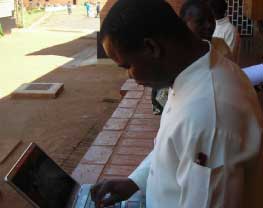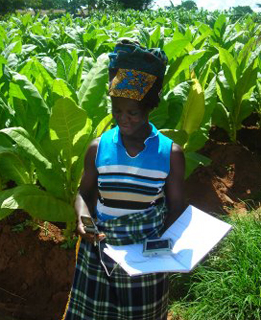FrontlineSMS:Medic is now Medic Mobile. From the start, FrontlineSMS:Medic implemented and extended FrontlineSMS to bridge gaps in healthcare delivery systems. After a successful pilot, the FrontlineSMS software and community acted as a launchpad for an organization that uses open source software to support health services across the globe. The launch of a new name, Medic Mobile, reflects the growth and trajectory of that organization. Medic Mobile will continue to be one of the most emphatic champions of FrontlineSMS – contributing code, user experiences, and peer-reviewed research back to the community. Here, Isaac Holeman and Josh Nesbit, co-Founders of FrontlineSMS:Medic, walk us through the history of the project, and where they see Medic Mobile heading in the future.
The FrontlineSMS:Medic Story
Inception


 FrontlineSMS:Medic was preceded by two independent projects, Mobiles in Malawi and MobilizeMRS. Josh Nesbit initiated Mobiles in Malawi in the summer of 2007, working at a rural Malawian hospital that serves 250,000 patients spread 100 miles in every direction. To reach remote patients, the hospital trained volunteer community health workers (CHWs) like Dickson Mtanga, a subsistence farmer. Dickson had to walk 35 miles to submit hand-written reports on 25 HIV-positive patients in his community. The hospital needed a simple means of communication, and in the summer of 2008 Josh returned to the hospital with mobile phones and a laptop running FrontlineSMS to provide it.
FrontlineSMS:Medic was preceded by two independent projects, Mobiles in Malawi and MobilizeMRS. Josh Nesbit initiated Mobiles in Malawi in the summer of 2007, working at a rural Malawian hospital that serves 250,000 patients spread 100 miles in every direction. To reach remote patients, the hospital trained volunteer community health workers (CHWs) like Dickson Mtanga, a subsistence farmer. Dickson had to walk 35 miles to submit hand-written reports on 25 HIV-positive patients in his community. The hospital needed a simple means of communication, and in the summer of 2008 Josh returned to the hospital with mobile phones and a laptop running FrontlineSMS to provide it.
MobilizeMRS was born with a focus on electronic medical records, and the notion that the technology could be extended to engage CHWs in structured data collection. Isaac Holeman discovered Mobiles in Malawi and contacted Josh online, and in late 2008 they decided to join forces. Isaac brought the key characteristics of MobilizeMRS with him – a commitment to extending OpenMRS, the initiative to formalize their projects as a venture, insistence that the venture should have a distinct brand and leadership authority, and commitment to developing innovative software.
In February of 2009, Josh, Isaac, and a group of students from Stanford and Lewis & Clark founded FrontlineSMS:Medic together. The mission was to help health workers communicate, coordinate patient care, and provide diagnostics using low-cost, appropriate technology.
Impact
 In six months, the pilot in Malawi using FrontlineSMS saved hospital staff 1200 hours of follow-up time and over $3,000 in motorbike fuel. Over 100 patients started tuberculosis treatment after their symptoms were noticed by CHWs and reported by text message. The SMS network brought the Home-Based Care unit to the homes of 130 patients who would not have otherwise received care, and texting saved 21 antiretroviral therapy (ART) monitors 900 hours of travel time, eliminating the need to hand deliver paper reports. You can read more about this pilot in the Journal of Technology and Health Care publication.
In six months, the pilot in Malawi using FrontlineSMS saved hospital staff 1200 hours of follow-up time and over $3,000 in motorbike fuel. Over 100 patients started tuberculosis treatment after their symptoms were noticed by CHWs and reported by text message. The SMS network brought the Home-Based Care unit to the homes of 130 patients who would not have otherwise received care, and texting saved 21 antiretroviral therapy (ART) monitors 900 hours of travel time, eliminating the need to hand deliver paper reports. You can read more about this pilot in the Journal of Technology and Health Care publication.
After the 2010 earthquake in Haiti, Josh reached out to FrontlineSMS users on the ground and connected with mobile operators. Soon after, FrontlineSMS:Medic helped coordinate The 4636 Project, an effort to create an emergency communications channel. Working with the Office of Innovation at the US Department of State, technology providers, Digicel, and Voila, a system was created to process text messages expressing urgent needs from the ground. Using crowd-sourced translation, categorization, and geo-tagging, reports were created for first responders within 5 minutes of receiving an SMS. Over 80,000 messages were received in the first five weeks of operation, focusing relief efforts for thousands of Haitians.
In less than one year, FrontlineSMS:Medic expanded from 75 to 1,500 end users linked to clinics serving approximately 3.5 million patients. Growing from the first pilot at a single hospital in Malawi, they established programs in 40% of Malawi’s district hospitals and implemented projects in nine other countries, including Honduras, Haiti, Uganda, Mali, Kenya, South Africa, Cameroon, India and Bangladesh.
A growing toolkit
In 2010, the FrontlineSMS:Medic team expanded and began creating new mobile tools. Software developers built on the FrontlineSMS platform to create a lightweight patient records system, PatientView, and a text-based information collection module, TextForms.
Developed by volunteers in less than two days, the initial 4636 system combined a number of technology platforms. Most recently, FrontlineSMS:Medic developers worked on a messaging module for OpenMRS, a project that had been in the works since the MobilizeMRS days prior to FrontlineSMS:Medic. It became clear to the team that building upon and implementing various open source tools was the best way to serve users and achieve impact.
Next Steps
FrontlineSMS acts as a catalyst for new projects – incubating ideas, teams, and software for legal systems, education, financial services, radio, and other fields. The model replicates FrontlineSMS:Medic’s sector-specific approach and builds on a community of users innovating every day
Medic Mobile continues FrontlineSMS:Medic’s team, values, and mission – using mobile tools to create connected, coordinated health systems that save more lives.




